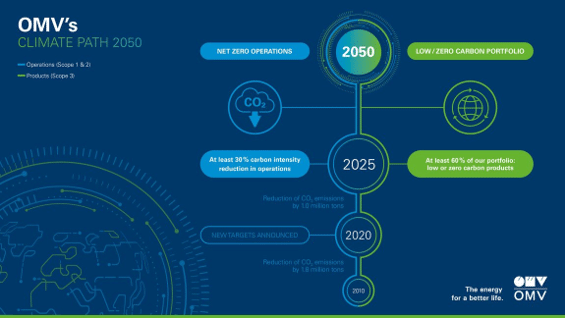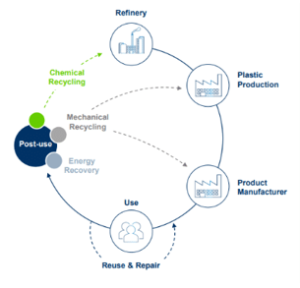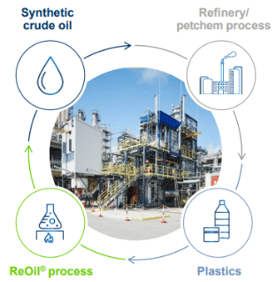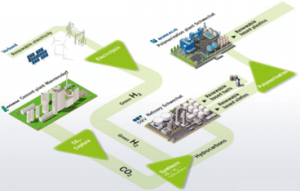Our guest commentary by Dr. Eric Schmiedchen, Investor Relations at OMV
OMV is one of Austria’s largest listed companies. The majority of our roughly 20,000 employees work at its integrated European sites. OMV aims to provide a secure supply of affordable energy for the sustainable development of society and the economy while respecting the environment.
Growing demand for energy and accelerating climate change pose immense challenges for the energy sector. The key lies in finding the balance between climate protection efforts, affordable energy, and reliable supply. The economy needs alternative energy systems as well as economically viable and scalable technologies to satisfy the growing demand for energy.
OMV is fully committed to climate change mitigation and responsible resource management, and has consequently set targets to manage and reduce the carbon footprint of our operations and product portfolio. Reducing greenhouse gases will decrease our environmental impact, have a positive financial impact by improving compliance with climate-related regulatory requirements and ensuring the efficient use of resources, and providing financial opportunities in low-carbon technologies. We strive to be one of the low-carbon leaders in the oil and gas industry.
As we have reached our 2025 targets ahead of time, in July, we set ourselves new, more ambitious targets for CO2 reduction by 2025, and our new important long-term commitment for our operations.
OMV’s Climate Path 2050
- We will reach net-zero GHG emissions of operations (scope 1 and 2) by 2050 or sooner.
On the way to the long-term ambition, OMV is setting concrete intermediate intensity goals. By 2025 a reduction of at least 60% for Upstream and at least 20% for Refining will be achieved (both compared to 2010). This means the carbon intensity groupwide (excluding Borealis) is to be reduced by at least 30%. Between 2020 and 2025, OMV intends to reduce its CO2-equivalent emissions in operated assets by at least 1 mn t.
- We want to become a leader in circular economy.
We will combine the chemical and mechanical plastics recycling potential of OMV and Borealis and invest up to EUR 1 bn in innovative solutions like ReOil® by 2025
- We will continue to reduce the carbon footprint of our product offering. By 2025, at least 60% of our portfolio will consist of low and zero-carbon products.
This means that we will increasingly use precious oil for petrochemical products, expand our gas, hydrogen and e-mobility offerings, and deliver advanced biofuels.
In the following, we will provide more details and briefly describe how OMV will reach these targets.
Towards net-zero operations 2050
OMV aims to reach net-zero operations by 2050 or sooner. To reduce greenhouse gas emissions from operations, OMV is applying energy efficiency measures, using renewable electricity, modernizing our equipment and processes, and reducing the venting and flaring of gas.
We are turning to renewable sources of electricity to power our operations. For example, OMV and Verbund are building Austria’s largest photovoltaic plant. The plant is set to become operational this November and will help power our operations in Austria.
Towards a circular future
The transition to a circular economy will significantly reduce our impact on the environment and our CO2 emissions. A circular economy is essential for a low-carbon future. Through the efficient use of our precious resources, we can recover and reuse byproducts or waste to make new materials and products. This process has the potential to significantly reduce associated emissions right across product value chains. Together, OMV and Borealis aim to be leaders in circular economy by combining their competencies in chemical and mechanical plastics recycling.
 The ReOil® pilot project realized in the Schwechat Refinery (Austria) uses hard-to-recycle plastic waste to produce synthetic crude in a pyrolysis process. This recycled crude can be processed into any desired refinery product. This will reduce our dependency on new fossil resources and improve our carbon intensity since substituting crude oil with post-consumer plastics is estimated to lead to 45% lower CO2 emissions in the use of this product. By 2025, OMV aims to develop ReOil® into a commercially viable, industrial-scale recycling technology with a processing capacity of approximately 200,000 t of used plastics per year.
The ReOil® pilot project realized in the Schwechat Refinery (Austria) uses hard-to-recycle plastic waste to produce synthetic crude in a pyrolysis process. This recycled crude can be processed into any desired refinery product. This will reduce our dependency on new fossil resources and improve our carbon intensity since substituting crude oil with post-consumer plastics is estimated to lead to 45% lower CO2 emissions in the use of this product. By 2025, OMV aims to develop ReOil® into a commercially viable, industrial-scale recycling technology with a processing capacity of approximately 200,000 t of used plastics per year.
OMV, Lafarge, VERBUND, and Borealis signed a Memorandum of Understanding to design and build a full-scale plant to capture CO2 by 2030. This CO2 will then be processed into synthetic fuels, plastics or other chemicals. Climate neutrality, a circular economy and innovation in Austria will all be enhanced by establishing a cross-sector value chain for carbon capture.
Towards a lower carbon product portfolio
By 2025, at least 60% of our product portfolio will be composed of low and zero-carbon products. This means that we will use oil for petrochemical products, expand our gas, hydrogen and e-mobility offerings, and deliver advanced biofuels.
In 2020, we made a big step towards transforming our product portfolio by signing the acquisition of a majority stake in Borealis. Our vision is finding long-lasting, high-tech applications for hydrocarbons rather than burning them as fuel. Products based on petrochemicals are used extensively in our daily lives.
Gas also has a role in power generation and mobility during the transition phase. Replacing lignite-fired power plants with gas reduces CO2 emissions by 50%. Gas in the form of natural gas, biomethane, hydrogen, and synthetic methane supports the integration of renewable energies.
Conclusion:
OMV is committed to building a sustainable world worth living in for everyone. We are aware of our responsibility and we will live up to our commitment to the Paris Agreement and the EU climate targets. The 2050 net-zero ambition for our operations is important but is only the first step. We will also address the emissions caused by our product portfolio. We will share with you our 2050 ambition in that area at our Capital Markets Day next year.
Legal note:
Prognoses are no reliable indicator for future performance.
Legal disclaimer
This document is an advertisement. Unless indicated otherwise, source: Erste Asset Management GmbH. The language of communication of the sales offices is German and the languages of communication of the Management Company also include English.
The prospectus for UCITS funds (including any amendments) is prepared and published in accordance with the provisions of the InvFG 2011 as amended. Information for Investors pursuant to § 21 AIFMG is prepared for the alternative investment funds (AIF) administered by Erste Asset Management GmbH pursuant to the provisions of the AIFMG in conjunction with the InvFG 2011.
The currently valid versions of the prospectus, the Information for Investors pursuant to § 21 AIFMG, and the key information document can be found on the website www.erste-am.com under “Mandatory publications” and can be obtained free of charge by interested investors at the offices of the Management Company and at the offices of the depositary bank. The exact date of the most recent publication of the prospectus, the languages in which the fund prospectus or the Information for Investors pursuant to Art 21 AIFMG and the key information document are available, and any other locations where the documents can be obtained are indicated on the website www.erste-am.com. A summary of the investor rights is available in German and English on the website www.erste-am.com/investor-rights and can also be obtained from the Management Company.
The Management Company can decide to suspend the provisions it has taken for the sale of unit certificates in other countries in accordance with the regulatory requirements.
Note: You are about to purchase a product that may be difficult to understand. We recommend that you read the indicated fund documents before making an investment decision. In addition to the locations listed above, you can obtain these documents free of charge at the offices of the referring Sparkassen bank and the offices of Erste Bank der oesterreichischen Sparkassen AG. You can also access these documents electronically at www.erste-am.com.
Our analyses and conclusions are general in nature and do not take into account the individual characteristics of our investors in terms of earnings, taxation, experience and knowledge, investment objective, financial position, capacity for loss, and risk tolerance. Past performance is not a reliable indicator of the future performance of a fund.
Please note: Investments in securities entail risks in addition to the opportunities presented here. The value of units and their earnings can rise and fall. Changes in exchange rates can also have a positive or negative effect on the value of an investment. For this reason, you may receive less than your originally invested amount when you redeem your units. Persons who are interested in purchasing units in investment funds are advised to read the current fund prospectus(es) and the Information for Investors pursuant to § 21 AIFMG, especially the risk notices they contain, before making an investment decision. If the fund currency is different than the investor’s home currency, changes in the relevant exchange rate can positively or negatively influence the value of the investment and the amount of the costs associated with the fund in the home currency.
We are not permitted to directly or indirectly offer, sell, transfer, or deliver this financial product to natural or legal persons whose place of residence or domicile is located in a country where this is legally prohibited. In this case, we may not provide any product information, either.
Please consult the corresponding information in the fund prospectus and the Information for Investors pursuant to § 21 AIFMG for restrictions on the sale of the fund to American or Russian citizens.
It is expressly noted that this communication does not provide any investment recommendations, but only expresses our current market assessment. Thus, this communication is not a substitute for investment advice.
This document does not represent a sales activity of the Management Company and therefore may not be construed as an offer for the purchase or sale of financial or investment instruments.
Erste Asset Management GmbH is affiliated with the Erste Bank and austrian Sparkassen banks.
Please also read the “Information about us and our securities services” published by your bank.


